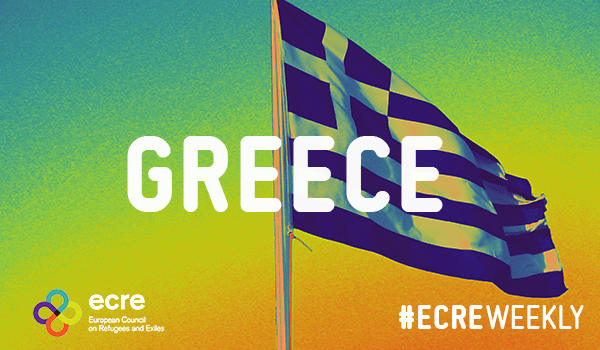As the Migration Ministry announces the end of cash allowance for asylum seekers living independently, experts fear that the living situation of thousands is going to deteriorate. 53 unaccompanied children are living on the streets of Thessaloniki, NGO finds. The lack of medical and particular psychological care for asylum seekers on Lesvos and elsewhere persists amid ongoing closure of the Kara Tepe municipal camp that offers humane living conditions. Second judgement by a German Higher Administrative Court prevents returns of beneficiaries of international protection in Greece due to risk of destitution. Trail for criminalised asylum seeker who faces decades in prison scheduled for 21 April.
The Greek Migration Ministry announced that the financial allowance for asylum seekers staying outside of structures under its competence will cease by 1 July. According to UNHCR data referred to by media, the ‘urban population’ – i.e asylum seekers living outside of the housing scheme – stood at about 25,000 in March 2021, while the number of asylum seekers who received financial assistance was 64,500. The ministry called on asylum seekers of the ‘urban population’ to submit a housing request if they lack the financial means to cover their basic needs. However, camps on the mainland and the ESTIA housing scheme lack sufficient capacity to absorb these people and waiting periods for state housing can last months. Experts on the ground fear that following this decision many asylum seekers will end up homeless and unable to survive without any support.
According to the local NGO ARSIS that runs a street-work project, more and more unaccompanied children are living on the street in Thessaloniki. In the first three months of 2021, the NGO counted 53 children and youth in the city, including many that were only between 11 and 14 years old. 36 belong to particularly vulnerable categories after being subjected to violence, forced separation from family members, exploitation and suffering from physical and psychological issues.
On Lesvos, the situation in the so-called Moria 2.0 camp near Kara Tepe remains dire. A General Practitioner who was on Lesvos in February and March to treat camp residents describes the conditions in the camp as a “disgrace for Europe”. Camp residents would start queuing in front of the container used as the doctor’s office at five o’clock in the morning – despite its opening hours from eight to two. The demand for medical consultation exceeds capacity and some people are refused. Yet, according to the GP, the greatest deficiency remains the lack of psychological care: “Help only follows when the suicide attempt has already taken place. Self-harm and expressing suicidal thoughts are part of the daily routine.” Previous incidents, such as the suicide attempt of a pregnant woman who set herself on fire or alarming scores of suicidal thoughts and attempts among children illustrate the precariousness of the situation. On 19 April, the Committee on Civil Liberties, Justice and Home Affairs (LIBE) hosted an exchange of views on mental health care and care for vulnerable asylum applicants in Greek reception facilities that was attended by Margaritis Schinas, Vice-President of the European Commission.
Contrary to the substandard conditions in Moria 2.0, humane accommodation alternatives exist on Lesvos but are being closed by the Greek authorities. In their latest issue of the Lesvos Bulletin, ECRE member the Greek Council for Refugees (GCR) and Oxfam criticize the closure of the Kara Tepe municipal camp, which has “for years offered dignified alternatives for vulnerable asylum seekers”. The closure is currently underway and the camp’s residents are being transferred to Moria 2.0. The NGOs call on the authorities to keep the site open and to evacuate Moria 2.0.
On 19 April, the Higher Administrative Court of Lower Saxony ruled in a case of two Syrian sisters that beneficiaries of international protection in Greece should not be returned to the country due to the destitution they are likely to face. According to the court, there is a serious risk that they would not be able to meet their most basic needs such as “bed, bread, soap” upon return to Greece. This follows previous court decisions that address destitution in Greece, including a judgement in January by the Higher Administrative Court of North Rhine-Westphalia. ECRE member PRO ASYL welcomes the judgement and calls for a general ban on deportations and protection for affected refugees.
As borderline-europe reports, the trial of K.S., a young man who fled Syria and is accused in Greece of “facilitating illegal entry” (smuggling), “illegal entry” and “provoking a shipwreck” (endangering human life) was scheduled for 21 April. The accused fled with his family from Syria via Turkey and they arrived in Chios by boat in early March 2020 at a time when Greece had suspended the right to asylum. He was arrested and held in pre-trial detention on the mainland for over a year without being able to see his family. Commenting on the intensified criminalisation of people in need of protection in Greece that includes arresting asylum seekers upon arrival and detaining them for months, borderline-europe highlights: “When their case finally comes to court, their trials average only 38 minutes in length, and they are sentenced to heavy prison terms, in some cases over 100 years in prison with very high fines. For the combination of charges K.S. faces, the average sentence is 93 years.”
For further information:
- ECRE, Greece: “While Newly Arriving People Who Seek Protection Are Systematically Beaten Back to Turkey or Abandoned at Sea, Those Granted International Protection Status Are Left Destitute”, April 2021
- ECRE, Greece: EU Seeks to Reconfirm Turkey Agreement while Cross-border Accusations Continue as Does Pushbacks and Deprivation in Camps, April 2021
Photo: ECRE
This article appeared in the ECRE Weekly Bulletin. You can subscribe to the Weekly Bulletin here.

